Introduction
In the journey to recovery from addiction, setting and achieving goals is often highlighted as a pivotal strategy. It’s not just about aiming for sobriety; it’s about setting a clear, structured roadmap to guide individuals through the complexities of rehabilitation and beyond. Understanding the role and benefits of goal-setting, along with practical strategies like the SMART approach, enriches the recovery process, enabling individuals to rebuild their lives.
The Role of Goal-Setting in Addiction Recovery
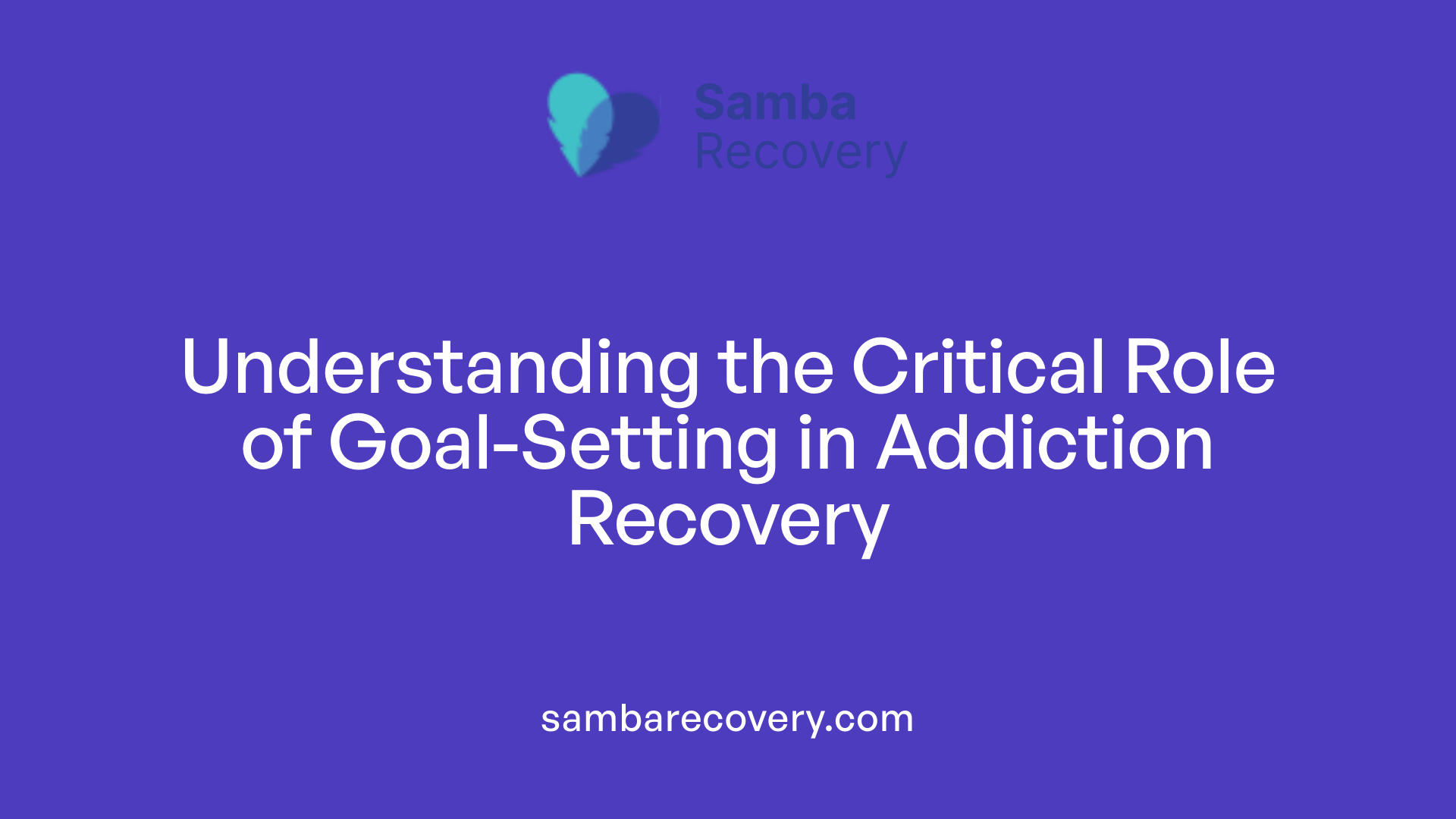
Why is goal-setting important in addiction recovery?
Goal-setting is a cornerstone of addiction recovery, offering direction and focus that are vital for overcoming the challenges encountered during the recovery journey. By establishing clear and attainable goals, individuals not only chart a path forward but also boost their self-esteem, improve their sense of purpose, and sustain their motivation throughout the process.
Incorporating the SMART framework—Specific, Measurable, Achievable, Relevant, and Time-bound—enhances goal clarity. This structure provides a roadmap for success, allowing individuals to break down larger objectives into smaller, manageable steps. For example, a short-term goal could be attending weekly support group meetings, whereas a long-term aspiration might involve maintaining sobriety for a year. Celebrating these small victories fosters a sense of accomplishment, fueling further progress toward recovery.
Goals in recovery also highlight the importance of community. By sharing objectives with supportive friends or recovery groups, individuals gain accountability and encouragement, making it easier to navigate setbacks. Moreover, flexibility is crucial; adjusting goals as circumstances evolve ensures that they remain relevant, fostering resilience in the recovery journey. In essence, goal-setting empowers individuals to take ownership of their recovery, transforming challenges into achievable milestones.
Understanding and Applying SMART Goals
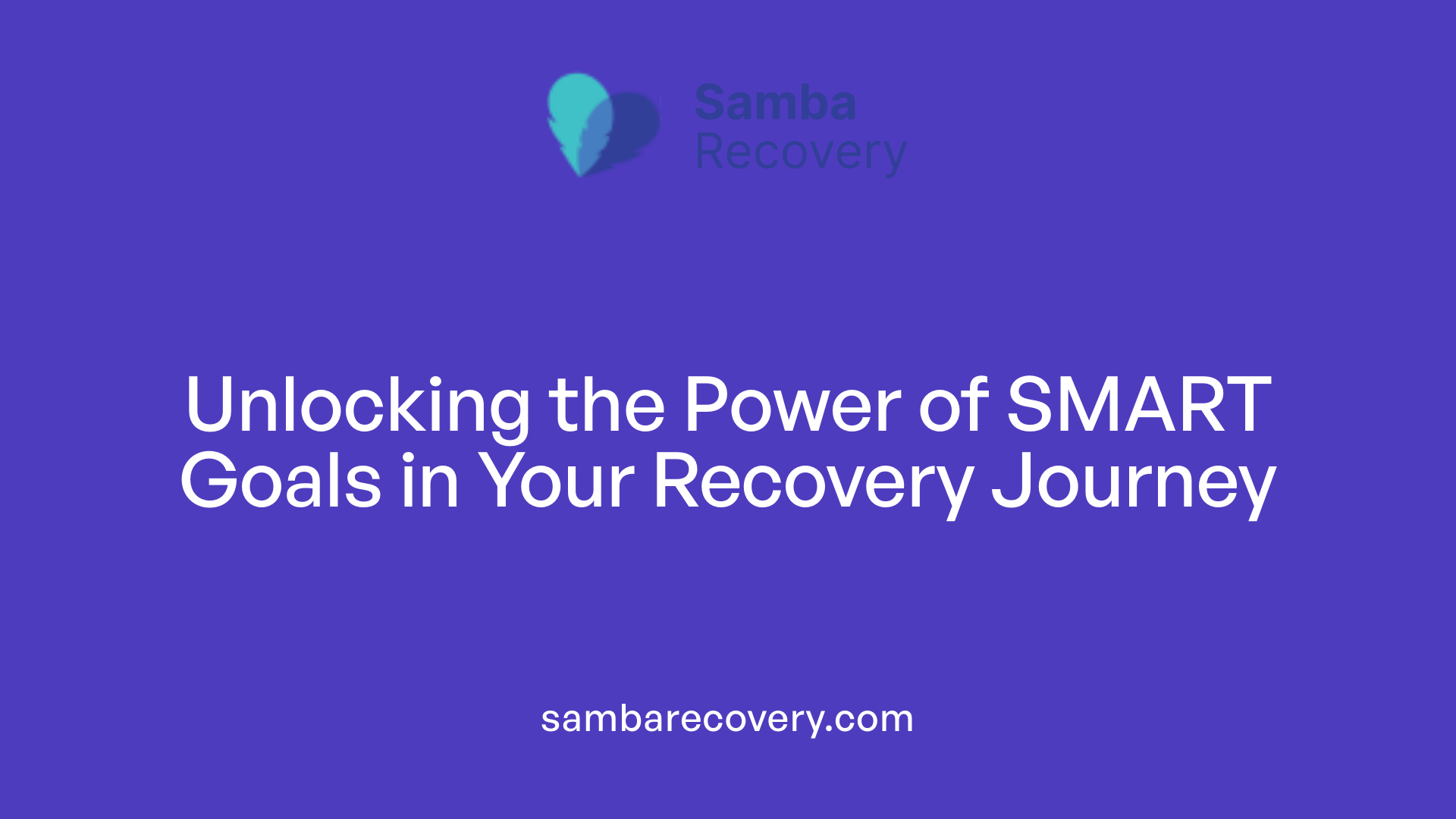
What are SMART goals and how can they be applied in addiction recovery?
SMART goals stand for Specific, Measurable, Achievable, Relevant, and Time-bound. This framework helps individuals in addiction recovery to define and focus on their objectives effectively, enhancing their chances of success. By being specific, a goal like "attending support group meetings regularly" provides clarity, while measurable aspects, such as tracking attendance, allow for clear progress measurement.
Applying SMART goals in recovery involves a structured approach. For example, a person might set an achievable goal to "stop using substances for one week," which can be progressively adjusted. Goals should be relevant to the individual’s life circumstances, addressing areas like mental health and relationship rebuilding, which are crucial in recovery. Setting a time-bound goal, such as committing to an outpatient treatment program for a set period fosters accountability and a sense of urgency.
Examples of SMART goals
Here are some practical examples that illustrate SMART goals in action:
| Goal Type | Specific Description | Timeframe |
|---|---|---|
| Short-term | Attend therapy sessions twice a week | For the next 4 weeks |
| Measurable | Walk for 30 minutes daily to improve physical fitness | Over the next month |
| Achievable | Complete a 12-Step program within 3 months | By the end of the program |
| Relevant | Volunteer for a community group to build social ties | Within the next month |
| Time-bound | Maintain sobriety for 90 days and then reevaluate goals | 3 months from now |
These goals create a pathway toward achieving long-term recovery objectives, enhancing motivation and providing a clear focus on personal growth.
Short-Term and Long-Term Goals: Building a Recovery Path
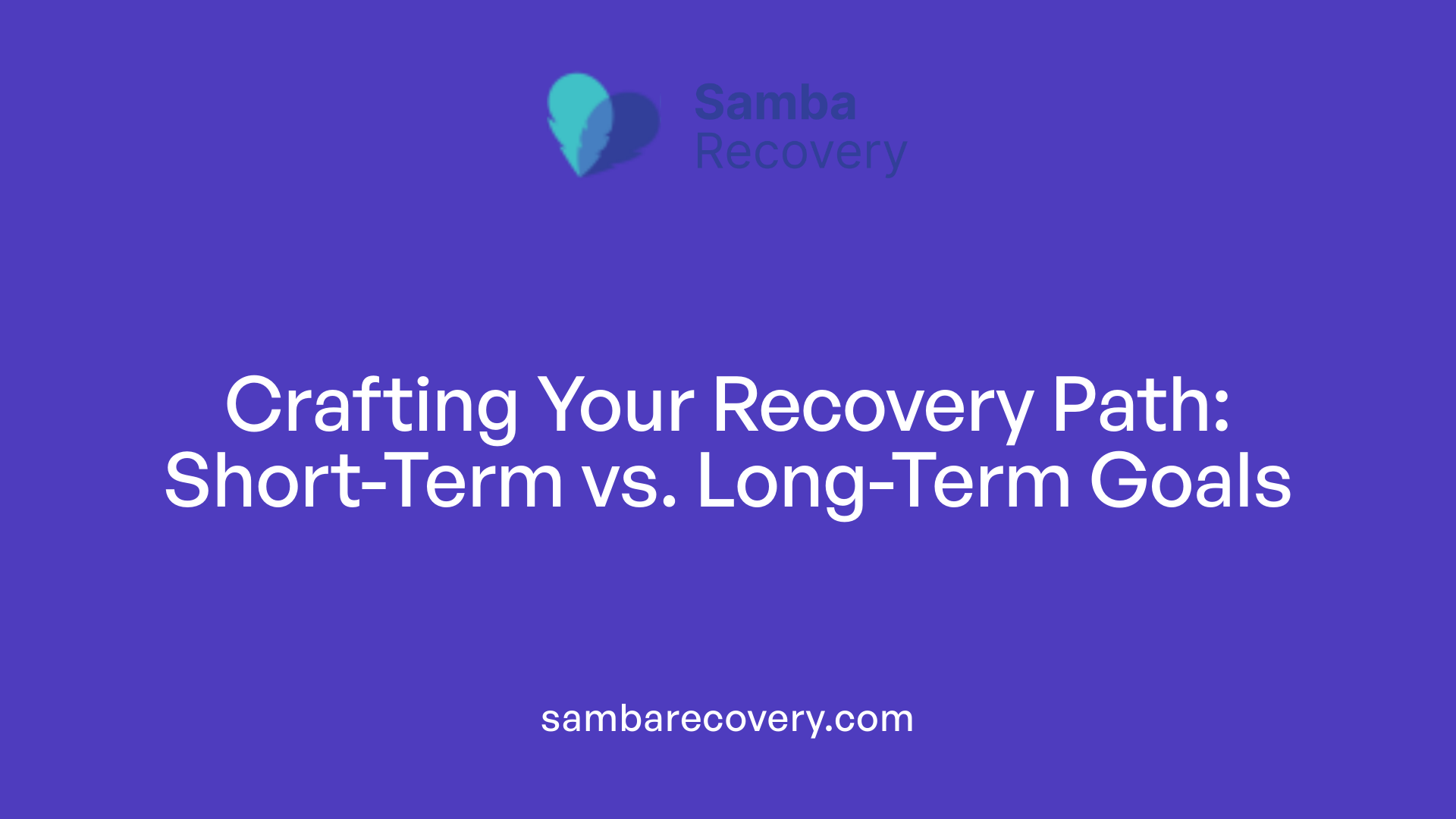
What are some examples of short-term and long-term goals for addiction recovery?
Short-term goals for addiction recovery can include:
- Attending recovery meetings: Regular participation in support groups like Alcoholics Anonymous helps individuals stay engaged.
- Daily self-care practices: Simple goals such as meditation, exercise, or journaling reinforce positive daily habits.
- Quiet time for reflection: Setting aside moments each day to reflect on thoughts and feelings aids in personal insight.
In contrast, long-term goals might encompass:
- Achieving financial stability: Establishing a budget and saving money can provide a sense of control and security.
- Rebuilding family connections: Actively working on repairing relationships can be pivotal.
- Gaining employment or pursuing education: Setting goals like completing a degree or securing a job reinforces personal growth over time.
SMART goals, such as "I will start weekly therapy sessions by next week" or "I will save $50 a week for a year," guide individuals through their recovery journey.
Why is it important to set both types of goals?
Creating a balanced approach with both short-term and long-term goals is crucial. Short-term goals help maintain motivation and allow individuals to experience immediate satisfaction. In contrast, long-term goals provide vision and direction, fostering resilience and sustained commitment to recovery.
How can you create a balanced recovery plan?
When crafting a recovery plan, consider the following:
- Incorporate flexibility to adapt as circumstances change.
- Track progress through measurable steps to maintain accountability.
- Celebrate small victories to boost confidence and motivation.
This structured framework supporting both immediate and future objectives helps keep individuals focused and engaged throughout their recovery journey.
Goal-Setting for Personal Development and Accountability
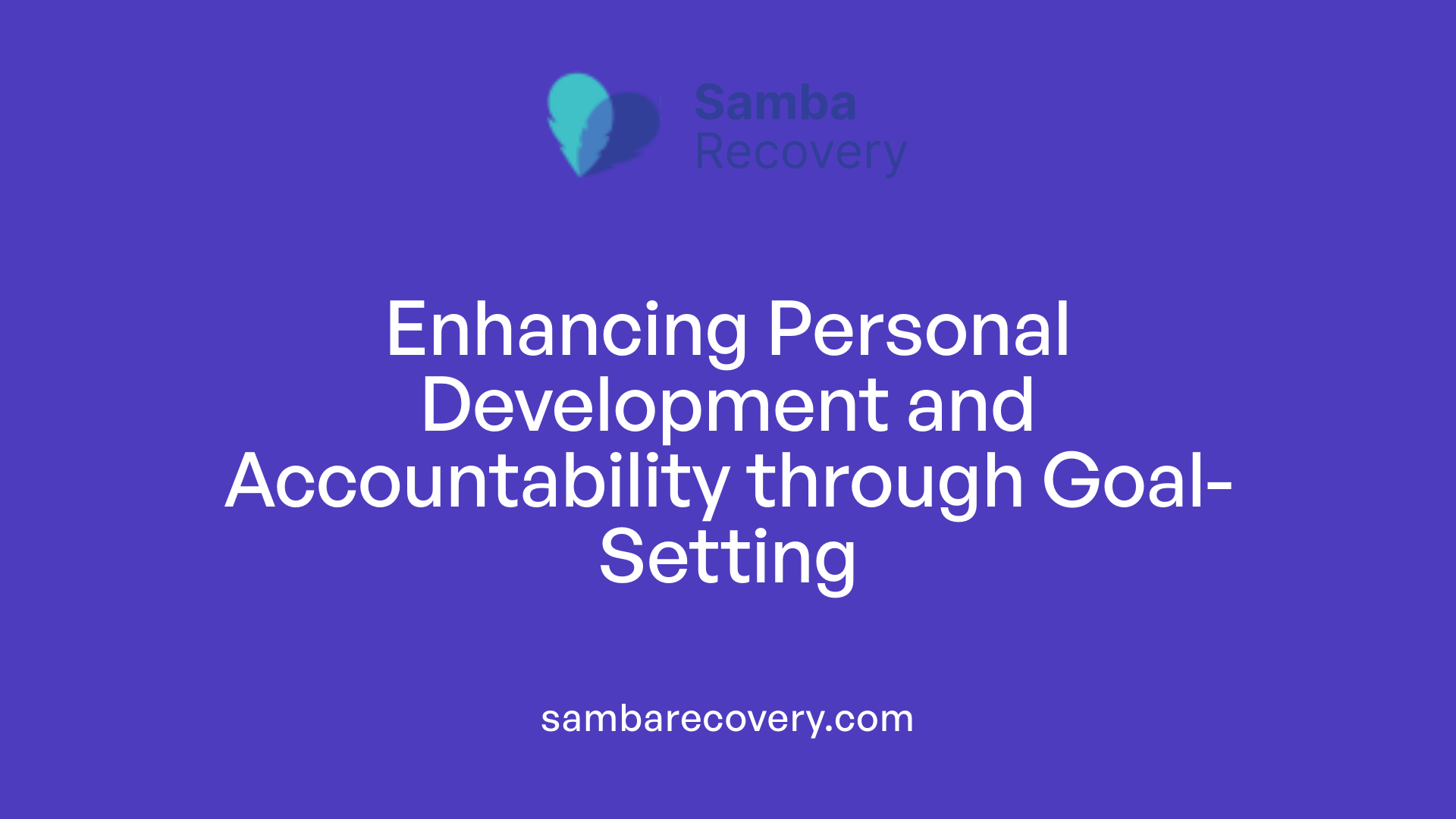
How does goal-setting contribute to personal development and accountability in sobriety?
Goal-setting is a powerful tool in addiction recovery that fosters personal development and enhances accountability. By setting structured and specific goals, individuals can create a path toward achieving their recovery milestones.
Using the SMART criteria—Specific, Measurable, Achievable, Relevant, and Time-bound—helps ensure that goals are clear and manageable. For instance, rather than merely aiming for long-term sobriety, a person might set short-term goals, such as attending support group meetings or participating in therapy sessions. This approach provides actionable steps that contribute to personal growth.
Enhancing personal development through goals
Setting realistic and relevant goals encourages the development of healthy habits and coping mechanisms. These goals not only improve emotional health but also foster essential life skills, such as patience and resilience. Achieving these smaller goals leads to a sense of accomplishment, which enhances motivation and self-esteem.
Moreover, measurable goals enable individuals to track their progress, reinforcing their commitment to recovery. For example, a goal might involve attending therapy weekly for three months, promoting accountability and focused engagement in the recovery process.
Building accountability in recovery
A strong support network plays a crucial role in maintaining accountability. Sharing goals with friends, sponsors, or support groups enhances motivation, as individuals feel more empowered to stay committed to their objectives. Regular check-ins with these support systems are instrumental in navigating the ups and downs of recovery, acting as a safety net and reinforcing positive behavior.
In essence, the goal-setting process is a key element of recovery, acting as a roadmap that guides individuals toward personal development while emphasizing accountability and support.
Psychological Benefits of Goal-Setting in Recovery
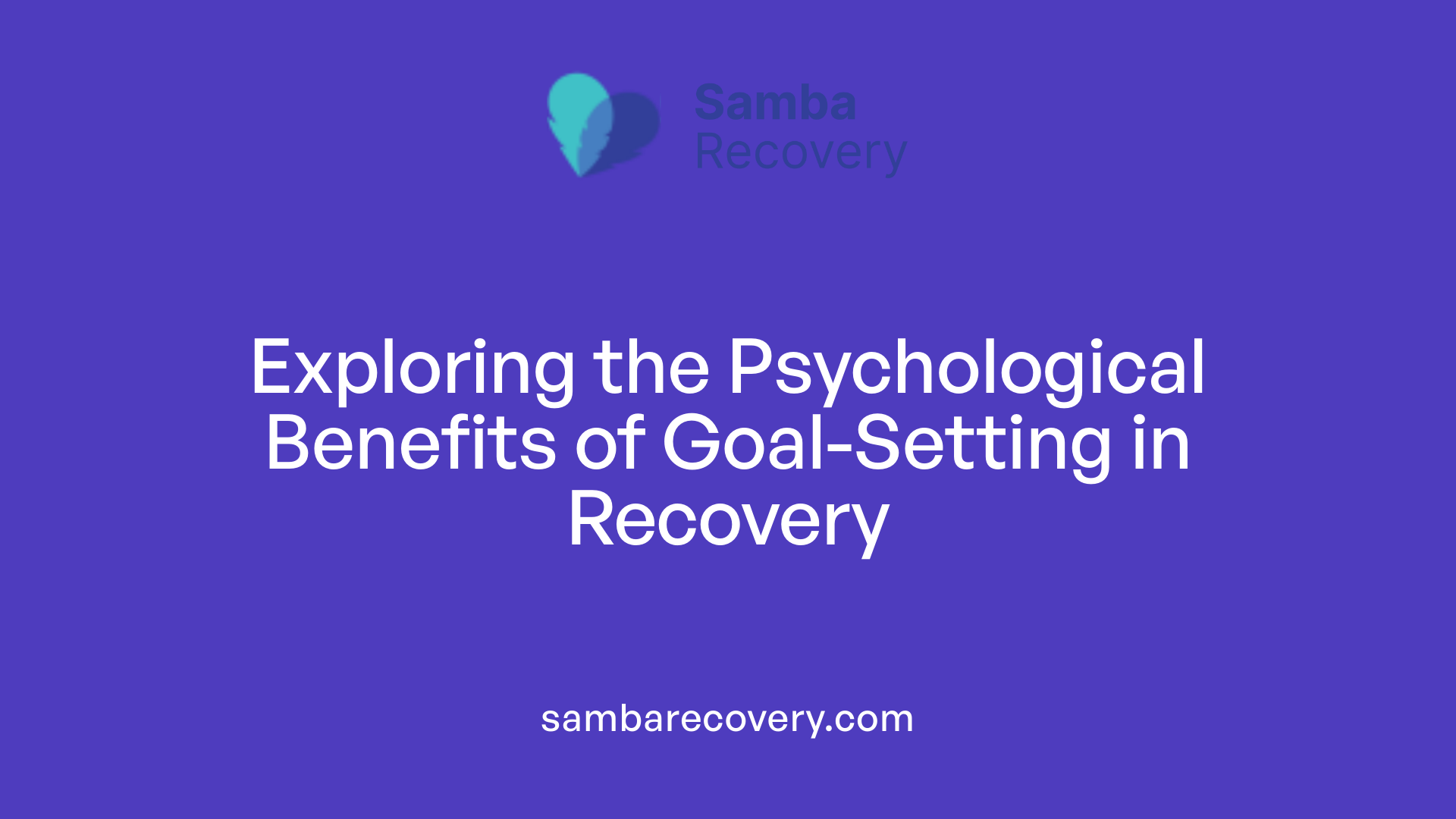
How do psychological benefits of goal-setting assist individuals in recovery?
The psychological benefits of goal-setting significantly aid individuals in recovery by enhancing motivation, purpose, and self-esteem. When individuals engage in personalized goal planning, they develop a stronger sense of ownership over their recovery journey, which can lead to improved self-efficacy. This collaborative aspect fosters a supportive environment where service users and practitioners work together to identify actionable steps.
Breaking overarching objectives into smaller, achievable tasks helps individuals focus on immediate progress. This method creates quick wins that foster a sense of accomplishment, aiding in steady motivation. Employing the SMART framework—Specific, Measurable, Achievable, Relevant, and Time-bound—provides a structured approach to setting goals. For example, rather than aiming to be sober indefinitely, a person may set short-term goals like attending three support group meetings each week.
These approaches not only help in substance use recovery but also promote broader personal growth and emotional well-being. Individuals are encouraged to monitor their progress, celebrate small wins, and adjust goals as needed. This adaptability is crucial in overcoming challenges and setbacks that may arise during recovery, reinforcing a forward-focused mindset.
The Collaborative Nature of Goal-Setting in Recovery
What is the collaborative process of goal-setting and its importance in behavior change during recovery?
The collaborative process of goal-setting in addiction recovery is essential for establishing effective and personalized objectives. It involves individuals working closely with their therapists, support groups, and family to create realistic recovery goals that resonate with their unique needs and values. This teamwork not only fosters a sense of belonging but enhances motivation significantly.
Key characteristics of effective goals include:
- Approach-oriented: Focus on developing skills and positive behaviors rather than merely avoiding negative outcomes.
- Mastery-focused: Aims for growth and achievement in a compassionate way, avoiding performance pressure.
- SMART criteria: Ensures goals are Specific, Measurable, Achievable, Relevant, and Time-bound, promoting clarity and feasibility.
The ongoing presence of support systems plays a pivotal role in this process. By creating clear action plans and incorporating coping strategies to navigate potential obstacles, individuals are better equipped to manage setbacks. This collaborative goal-setting not only enhances commitment and self-efficacy but is critical for instigating favorable behavior changes that lead to lasting recovery outcomes.
Conclusion
Goal-setting is undeniably a cornerstone of the recovery journey, providing a structured path that enhances motivation, accountability, and personal development. By incorporating SMART goals and leveraging collaborative support systems, individuals in recovery can navigate their journey with a sense of clarity and purpose. As they achieve each milestone, the sense of accomplishment not only reinforces their commitment to sobriety but also instills a deeper understanding of their resilience and capabilities. In essence, goal-setting is more than just a tool; it is the bedrock upon which a healthier, more fulfilling sober life is built.
References
- How to Set Realistic and Achievable Goals for Addiction Recovery
- 10 Realistic Goals in Early Recovery – Tranquility Woods
- Why Goal-Setting Is So Important in Recovery – Renaissance Ranch
- The Importance of Step-By-Step Goal Setting in Addiction Recovery
- Can Goal-Setting Aid In Maintaining Long-Term Sobriety?
- The Power of Goal Setting in Addiction Treatment: Evidence and …
- The Importance Of Goal Setting In The Recovery Process –






